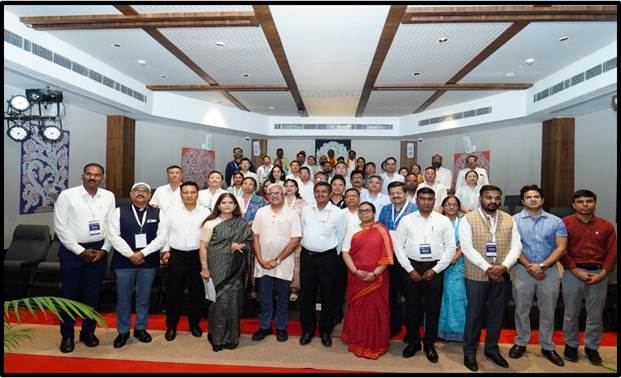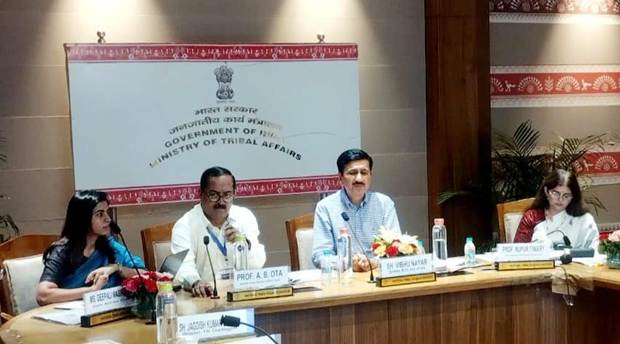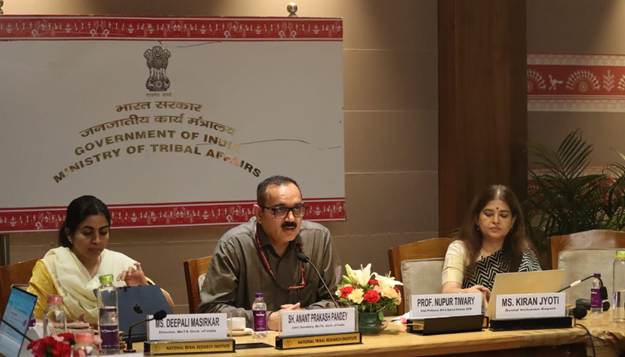Ministry of Tribal Affairs
National Consultation on Strengthening Tribal Research Institutes (TRIs)
Posted On:
01 AUG 2025 6:35PM by PIB Delhi
As part of its ongoing commitment to strengthening Tribal Research Institutes (TRIs) in alignment with the vision of Viksit Bharat by 2047, the Ministry of Tribal Affairs (MoTA), in collaboration with the National Tribal Research Institute (NTRI), organized a two-day National Consultation on “Capacity Building and Strengthening of TRIs” from 28th to 29th July 2025 at NTRI, New Delhi.
The consultation was convened to address critical challenges faced by TRIs in enhancing tribal research, organizing training and cultural programs, and contributing meaningfully to the socio-economic development of tribal communities. The event brought together over 50 stakeholders, including experts, policymakers, academicians, and practitioners from across India.


Shri Vibhu Nayar, Secretary, Ministry of Tribal Affairs, Government of India, emphasized the importance of grounding ideas in field realities. He said, "Workshops and consultations are meaningful only when linked to field implementation. True leadership and learning emerge on the ground, not in administrative silos. Even small, lean teams can drive impactful change. We must engage directly with villages to understand their realities."He also encouraged the use of community-level visual tools, like painted walls or public blackboards, to promote participatory governance and knowledge sharing.
Shri R. Balasubramaniam, Member-HR, Capacity Building Commission, called for a paradigm shift in tribal research. He said, “We must move away from top-down approaches and embrace participatory research rooted in humility and mutual respect. Tribal voices should be embedded into the national narrative by promoting their languages, knowledge systems, and aspirations.” He proposed a ‘Convergence Model of Capacity Building’ that integrates scientific knowledge with traditional wisdom.

Shri Anant Prakash Pandey, Joint Secretary, Ministry of Tribal Affairs, outlined the transformative vision of the Adi Karmayogi Abhiyan, a flagship initiative to achieve Viksit Bharat by 2047. He said, "The mission aims to build a cadre of 2 million grassroots change leaders, creating last-mile service saturation in 1 lakh tribal villages across 550+ districts.” He positioned TRIs as not just knowledge hubs but strategic actors in capacity building and invited CSOs, NGOs, and district administrations to co-own and implement the initiative.
Ms. Deepali Masirkar, Director, Ministry of Tribal Affairs, underscored the need for stronger connections and mechanisms between MoTA and TRIs. She said, "Reorienting the role of TRIs and converging them with ambitious initiatives like Adi Karmayogi, backed by adequate funding, is essential to revitalizing these institutions."Key areas discussed included fund allocation, capacity building, and strategies for institutional reform and strengthening.
Prof. Virginius Xaxa, renowned academician, called for a redefinition of the TRI mandate. He highlighted, "TRIs are facing a decline in relevance and resources. They must evolve into dynamic institutions that reflect regional realities, integrating insights from political science, sociology, economics, and other disciplines—not just anthropology."He urged greater alignment with grassroots issues in education, health, and economic development.
Prof. Akhil Bihari Ota, Former Director, SCSTRTI and Odisha State Tribal Museum, emphasized that there must be seamless coordination and shared ownership across institutions for TRIs to effectively fulfil their mandates."He also advocated for the establishment of dedicated Project Management Units (PMUs) within each TRI to ensure focused implementation of their objectives. He further stressed the need for robust infrastructure, qualified human resources, and timely, assured funding support, both from MoTA and State budgets, as foundational to revitalizing TRIs and enhancing their impact.
Prof. Nupur Tiwary, Special Director, NTRI, reiterated the consultation's aim to formulate actionable strategies for revitalizing TRIs. She said, "Through knowledge-sharing, stakeholder collaboration, and strategic planning, this consultation seeks to optimize the impact of TRIs on tribal development while promoting convergence, efficiency, and resource effectiveness."
The consultation concluded with a resolve to work on the following points,
- Strategy and Action Plan for Developing Model TRIs
- Compilation of Best Practices and Replication Methodologies
- Formulation of National Capacity Building Measures
- Promotion of Convergence and Collaboration among TRIs
This consultation marks a crucial step toward building future-ready Tribal Research Institutes, equipped to meet the evolving needs of India’s tribal communities.
****
RN/
(Release ID: 2151495)